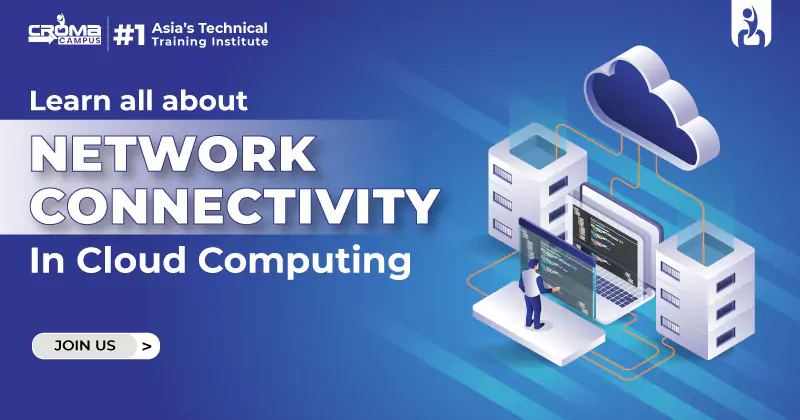Learn All About Network Connectivity In Cloud Computing
4.9 out of 5 based on 6574 votesLast updated on 13th Mar 2024 3.7K Views
- Bookmark

Cloud network connectivity enables seamless data transfer and communication between cloud resources, enhancing accessibility and scalability.

Introduction:
In the world of modern technology, cloud computing and networking play pivotal roles in enabling seamless connectivity, resource sharing, and security within digital environments. In the Cloud Computing Online Course, you will learn how cloud computing transforms service delivery, providing servers, storage, databases, and more through the internet. Networking, on the other hand, facilitates the connection of devices for communication and resource sharing.
Networking is vital in cloud computing, linking data centers, delivering services, and securing environments. Without it, cloud computing wouldn't function. In this blog, let us discuss network connectivity in cloud computing, use cases, functions, etc.
Cloud Computing Overview:
Cloud computing refers to the delivery of computing services over the internet, replacing the need for physical infrastructure. It offers flexibility, scalability, and cost-effectiveness, allowing users to scale resources as needed and pay only for what they use.
You May Also Read: Google Cloud for Students
Benefits:
- Easy scalability to meet fluctuating demands.
- Cost efficiency by eliminating upfront investments in hardware and software.
- Accessibility from anywhere with an internet connection.
- High availability and robust security measures provided by cloud providers.
Networking Overview:
Networking involves connecting computers, servers, and devices to enable communication and resource sharing.
Types of Networks: Local networks (e.g., home or office networks) and wide-area networks (e.g., the internet).
Benefits:
- Facilitates communication, file sharing, and real-time interactions.
- Enables resource sharing among connected devices, promoting efficiency and reducing costs.
- Allows for centralized security management and implementation of security measures.
The Role of Networking in Cloud Computing:
- Connecting Data Centers:
- Cloud providers use networks to interconnect their data centers, ensuring high availability and scalability of cloud services.
- Facilitates the transfer of data and resource sharing between data centers.
- Delivering Cloud Services:
- Networks are crucial for delivering cloud services to users, ensuring efficient data transfer between infrastructure and end-users.
- Utilizes various network technologies, including the Internet and private networks, to enable access from anywhere with minimal latency.
- Securing Cloud Computing Environments:
- Networking plays a significant role in securing cloud environments and implementing measures such as firewalls, VPNs, and intrusion detection systems.
- Enables traffic monitoring and encryption to ensure data confidentiality and integrity within the cloud infrastructure.
You May Also Read: Google Cloud Digital Leader Certification Cost
Understanding Cloud Network Connectivity
Cloud networking encompasses the capability to link resources within a cloud, across clouds, and with on-premises data centers. For effective cloud networking, providers offer three key types of connectivity:
- Site-to-Cloud Connectivity:
- Traditionally achieved through a cloud interconnect or VPN, enabling communication between on-premises equipment and cloud resources.
- Transit VPCs facilitate automatic route exchange between on-premises and multiple VPCs.
- A newer approach involves integrating cloud providers into an SD-WAN mesh using a router virtual appliance in Google Cloud's Network Connectivity Center, enabling dynamic route synchronization via BGP.
- Site-to-Site Connectivity:
- Facilitates direct network connectivity between hybrid connection points (VPN, Interconnect, or SD-WAN).
- Network Connectivity Center automates routing announcements, allowing seamless communication among all sites connected to a single global hub.
- VPC-to-VPC Connectivity:
- Involves creating a mesh of VPC connections, often achieved through VPC peering.
- VPC peering offers private, low-latency connectivity for customer networks across multiple VPCs, segmented via firewall policies.
- Alternatively, a transit VPC model connects multiple VPCs in a hub-and-spoke topology.
Additionally, tight integration with third-party router appliances enables leveraging solutions like next-generation firewalls to connect VPCs for specific compliance and segmentation needs. Network Connectivity Center streamlines this process by synchronizing routing tables between these appliances and VPCs, simplifying redundant configurations.
What's Ahead for Cloud Networking Connectivity in Google Cloud?
As enterprises increasingly shift diverse workloads to public cloud providers, networking structures are growing more intricate. In response, we offer solutions to address all connectivity requirements. Our goal is to maintain straightforward and understandable models and solutions. In the future, expect Network Connectivity Center to evolve into Google Cloud's centralized configuration hub for all connectivity necessities, equipped to manage even the most intricate networks.
You May Also Read: Google Cloud Engineer Roles And Responsibilities
FAQs on networking in Cloud Computing
1. How does networking contribute to the scalability of cloud computing?
Networking enables efficient workload distribution between data centers, allowing cloud services to scale seamlessly based on demand while maintaining performance.
2. Can networking enhance the security of cloud computing environments?
Yes, by implementing firewalls, VPNs, and IDS, networking plays a crucial role in monitoring and controlling network traffic, detecting unauthorized access, and encrypting data to mitigate security threats.
3. How does networking impact the availability of cloud services?
Networking provides multiple data paths, ensuring continuous connectivity and minimizing downtime during network failures, thus enhancing the availability of cloud services.
4. What challenges exist in networking for cloud computing?
Challenges include network congestion, latency, and data transfer speeds, which cloud providers continuously address to optimize performance.
5. Can networking help businesses save costs in cloud computing?
Yes, by enabling resource sharing and eliminating redundant infrastructure, networking optimizes resource utilization, reduces hardware costs, and enhances operational efficiency.
6. How can businesses ensure the reliability of networking in cloud computing?
Selecting reputable cloud providers prioritizing network redundancy and high availability, alongside implementing backup connections and disaster recovery plans, ensures reliable networking in cloud computing.
Conclusion:
In conclusion, networking forms the backbone of cloud computing, enabling connectivity, resource sharing, and security within digital ecosystems. Cloud computing providers rely on robust networking infrastructure to connect data centers, deliver services, and safeguard sensitive data, ensuring seamless operations and scalability. Understanding the critical role of networking in cloud computing is essential for leveraging the full potential of cloud-based applications and services.
To understand the concepts of network connectivity in cloud computing with AWS Course Online & Microsoft Azure Online Course connect with the Croma Campus expert team today and become more competitive than ever before.
Subscribe For Free Demo
Free Demo for Corporate & Online Trainings.

























.webp)
.webp)

.png)















